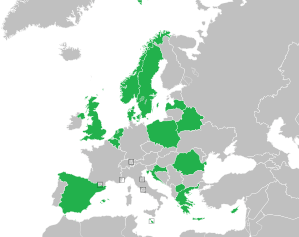Junior Eurovision Song Contest 2003
| Junior Eurovision Song Contest 2003 | ||||
|---|---|---|---|---|
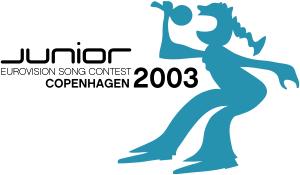 | ||||
| Dates | ||||
| Final | 15 November 2003 | |||
| Host | ||||
| Venue | Forum Copenhagen, Copenhagen, Denmark | |||
| Presenter(s) | Camilla Ottesen, Remee | |||
| Director | Arne J. Rasmussen | |||
| Executive supervisor | Svante Stockselius | |||
| Executive producer | Preben Vridstoft | |||
| Host broadcaster | Danmarks Radio (DR) | |||
| Opening act | Fu:el and Dance Faction | |||
| Interval act | Sugababes performing "Hole in the Head", Busted performing "Crashed the Wedding" | |||
| Participants | ||||
| Number of entries | 16 | |||
| Debuting countries | ||||
| Participation map
| ||||
| Vote | ||||
| Nul points | None | |||
| Winning song | "Ti si moja prva ljubav" | |||
| Junior Eurovision Song Contest | ||||
| ||||
The Junior Eurovision Song Contest 2003 was the first Eurovision Song Contest for young singers aged eight to fifteen. It was held on 15 November 2003, in Copenhagen, Denmark. With Camilla Ottesen and Remee as the presenters, the contest was won by the then eleven-year-old Dino Jelušić, who represented Croatia with his song "Ti si moja prva ljubav" (You are my first love) while second and third place went to Spain and the United Kingdom respectively. The next time that a country would win on its first attempt was Italy in 2014.
It was the first Eurovision contest to be broadcast in the 16:9 widescreen format. It was also the first Eurovision Song Contest where a DVD of the contest would be released. It was decided that the country that won the contest would not necessarily host the next contest, in order to reduce the pressure on the contestants.
Origins and history
The origins of the contest date back to 2000 when Danmarks Radio held a song contest for Danish children that year and the following year.[1][2] The idea was extended to a Scandinavian song festival in 2002, MGP Nordic, with Denmark, Norway and Sweden as participants.[3][4] The EBU picked up the idea for a song contest featuring children and opened the competition to all EBU member broadcasters making it a pan-European event. The working title of the programme was "Eurovision Song Contest for Children",[5] branded with the name of the EBU's already popular song competition, the Eurovision Song Contest. Denmark was asked to host the first programme after their experience with their own contests and the MGP Nordic.
Location
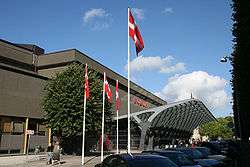
Forum Copenhagen (Danish: Forum København) is a large multi-purpose, rentable indoor arena located in Frederiksberg, Copenhagen, Denmark. It hosts a large variety of concerts, markets, exhibitions and other events. The venue can hold up to 10,000 people depending on the event. The Forum operates as a convention center, concert hall and indoor arena.
It was opened in February 1926 to host a car exhibition and was last renovated in 1996–97. Over two storeys there is a combined exhibition floor area of 5,000 m² and a separate restaurant for up to 250 seated guests. The Metro station Forum is adjacent to the building. Forum Copenhagen was designed by Oscar Gundlach-Pedersen, and the lighting was from Poul Henningsen's brand new PH-lamp. In 1929 it held an architecture exhibition, which was one of the first presentations of functionalism in Denmark, namely the Housing and Building Exhibition in Forum. It was at this exhibition that Arne Jacobsen and Flemming Lassen exhibited their subscription to the cylindrical "House of the Future".
Participating countries
16 countries competed in the first edition of the Junior Eurovision Song Contest.[6] In an original press release for the contest, then entitled the "Eurovision Song Contest for Children", a draw was held to select 15 countries to take part in the inaugural contest, with Slovakian broadcaster Slovenská televízia (STV) and German broadcaster ARD being drawn to compete along with 13 other countries.[7] These countries would eventually be replaced by entries from Poland, Cyprus and Belarus, in their first ever Eurovision event. The Finnish broadcaster Yleisradio (YLE) also expressed a debut in the first contest, but went on to just broadcast it instead.[8]
The draw for the running order of the contest was held on 6 October, with Greece drawn to open the contest and the Netherlands drawn to close.[9]
The rights to broadcast the contest were also acquired by broadcasters in Finland (YLE), Serbia and Montenegro (RTS/RTCG), Estonia (ETV), Germany (KIKA) and Australia (SBS).[10]
Results
| Draw | Country | Artist | Song | Language | Place | Points |
|---|---|---|---|---|---|---|
| 01 | |
Nicolas Ganopoulos | "Fili gia panta" (Φίλοι για πάντα) | Greek | 8 | 53 |
| 02 | |
Dino Jelušić | "Ti si moja prva ljubav" | Croatian | 1 | 134 |
| 03 | |
Theodora Rafti | "Mia efhi" (Μια ευχή) | Greek | 14 | 16 |
| 04 | |
Volha Satsiuk | "Tantsuy" (Танцуй) | Belarusian | 4 | 103 |
| 05 | |
Dzintars Čīča | "Tu esi vasarā" | Latvian | 9 | 37 |
| 06 | |
Marija & Viktorija | "Ti ne me poznavaš" (Ти не ме познаваш) | Macedonian | 12 | 19 |
| 07 | |
Kasia Żurawik | "Coś mnie nosi" | Polish | 16 | 3 |
| 08 | |
2U | "Sinnsykt gal forelsket" | Norwegian | 13 | 18 |
| 09 | |
Sergio | "Desde el cielo" | Spanish | 2 | 125 |
| 10 | |
Bubu | "Tobele sunt viaţa mea" | Romanian | 10 | 35 |
| 11 | |
X!NK | "De vriendschapsband" | Dutch | 6 | 83 |
| 12 | |
Tom Morley | "My Song for the World" | English | 3 | 118 |
| 13 | |
Anne Gadegaard | "Arabiens drøm" | Danish | 5 | 93 |
| 14 | |
The Honeypies | "Stoppa mig" | Swedish | 15 | 12 |
| 15 | |
Sarah Harrison | "Like a Star" | English | 7 | 56 |
| 16 | |
Roel Felius | "Mijn ogen zeggen alles" | Dutch | 11 | 23 |
Interval acts
The half time entertainment was provided by two acts from the UK. Busted performed "Crashed the Wedding" but Charlie Simpson was absent due to illness. However, the following day he was present for a radio interview in the UK where it was implied by both himself, and the other band members, that this was in fact a lie. The real reason for his absence was that he hated Eurovision. The Sugababes performed "Hole in the Head". The opening number was performed by Fu:el and Dance Faction.
Score sheet
| Results | ||||||||||||||||||
|---|---|---|---|---|---|---|---|---|---|---|---|---|---|---|---|---|---|---|
| |
|
|
|
|
|
|
|
|
|
|
|
|
|
|
|
| ||
| |
Greece | 53 | 7 | 12 | 1 | 5 | 1 | 1 | 7 | 5 | 2 | 7 | 1 | 3 | 1 | |||
| Croatia | 134 | 10 | 8 | 10 | 8 | 12 | 10 | 12 | 2 | 12 | 8 | 8 | 8 | 8 | 8 | 10 | ||
| Cyprus | 16 | 12 | 1 | 3 | ||||||||||||||
| Belarus | 103 | 5 | 12 | 6 | 10 | 10 | 12 | 10 | 1 | 7 | 5 | 5 | 4 | 7 | 6 | 3 | ||
| Latvia | 37 | 5 | 8 | 4 | 3 | 3 | 1 | 3 | 1 | 3 | 6 | |||||||
| Macedonia | 19 | 10 | 2 | 1 | 2 | 4 | ||||||||||||
| Poland | 3 | 3 | ||||||||||||||||
| Norway | 18 | 1 | 3 | 2 | 5 | 3 | 4 | |||||||||||
| Spain | 125 | 8 | 8 | 10 | 6 | 12 | 8 | 8 | 6 | 8 | 10 | 12 | 6 | 6 | 10 | 7 | ||
| Romania | 35 | 4 | 5 | 2 | 5 | 2 | 6 | 6 | 5 | |||||||||
| Belgium | 83 | 3 | 6 | 2 | 7 | 4 | 6 | 6 | 4 | 8 | 3 | 6 | 7 | 5 | 4 | 12 | ||
| United Kingdom | 118 | 7 | 4 | 7 | 12 | 7 | 3 | 7 | 5 | 10 | 10 | 4 | 12 | 10 | 12 | 8 | ||
| Denmark | 93 | 6 | 2 | 4 | 5 | 6 | 7 | 5 | 8 | 12 | 6 | 7 | 4 | 12 | 7 | 2 | ||
| Sweden | 12 | 1 | 2 | 3 | 5 | 1 | ||||||||||||
| Malta | 56 | 2 | 3 | 3 | 4 | 1 | 4 | 7 | 4 | 1 | 10 | 10 | 2 | 5 | ||||
| Netherlands | 23 | 1 | 4 | 2 | 12 | 2 | 2 | |||||||||||
12 points
Below is a summary of the maximum 12 points each country awarded to another:
| N. | Contestant | Voting nation |
|---|---|---|
| 3 | Croatia | Macedonia, Norway, Romania |
| United Kingdom | Belarus, Denmark, Malta | |
| 2 | Belarus | Croatia, Poland |
| Denmark | Spain, Sweden | |
| Spain | Latvia, United Kingdom | |
| 1 | Belgium | Netherlands |
| Cyprus | Greece | |
| Greece | Cyprus | |
| Netherlands | Belgium |
Commentators
-
 Greece – Masa Fasoula and Nikos Frantseskakis (ERT)[11]
Greece – Masa Fasoula and Nikos Frantseskakis (ERT)[11] -
 Norway – Stian Barsnes Simonsen (NRK1)
Norway – Stian Barsnes Simonsen (NRK1) -
 Spain – Fernando Argenta (TVE1)
Spain – Fernando Argenta (TVE1) -
.svg.png) Belgium – Ilse Van Hoecke and Bart Peeters (VRT TV1), Corinne Boulangier (RTBF La Deux)
Belgium – Ilse Van Hoecke and Bart Peeters (VRT TV1), Corinne Boulangier (RTBF La Deux) -
 United Kingdom – Mark Durden-Smith and Tara Palmer-Tomkinson (ITV)[12]
United Kingdom – Mark Durden-Smith and Tara Palmer-Tomkinson (ITV)[12] -
 Denmark – Nicolai Molbech (DR1)
Denmark – Nicolai Molbech (DR1) -
 Sweden – Victoria Dyring (SVT1)
Sweden – Victoria Dyring (SVT1) -
 Netherlands – Angela Groothuizen (Nederland 1)
Netherlands – Angela Groothuizen (Nederland 1) -
 Poland – Jarosław Kulczycki (TVP2)
Poland – Jarosław Kulczycki (TVP2) -
 Finland – Henna Vänninen and Olavi Uusivirta (YLE TV2)[13]
Finland – Henna Vänninen and Olavi Uusivirta (YLE TV2)[13] -
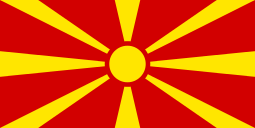 Macedonia – Milanka Rašik (MTV 1)
Macedonia – Milanka Rašik (MTV 1) -
 Finland (Non-participating country) – Unknown (YLE)
Finland (Non-participating country) – Unknown (YLE) -
 Estonia (Non-participating country) – Unknown (ETV)
Estonia (Non-participating country) – Unknown (ETV) -
 Germany (Non-participating country) – Unknown (KIKA)
Germany (Non-participating country) – Unknown (KIKA) -
 Australia (Non-participating country) – No commentator (SBS)
Australia (Non-participating country) – No commentator (SBS)
Official album
| Junior Eurovision Song Contest: Copenhagen 2003 | ||||
|---|---|---|---|---|
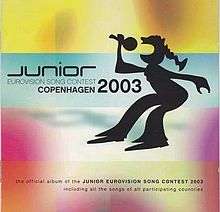 | ||||
| Compilation album by Junior Eurovision Song Contest | ||||
| Released | November 2003 | |||
| Genre | Pop | |||
| Length | 46:44 | |||
| Label | Universal | |||
| Junior Eurovision Song Contest chronology | ||||
| ||||
Junior Eurovision Song Contest: Copenhagen 2003, is a compilation album put together by the European Broadcasting Union, and was released by Universal Music Group on November 2003. The album features all the songs from the 2003 contest. On the track list Cyprus was misspelt as Cypres.
| No. | Title | Artist | Length |
|---|---|---|---|
| 1. | "Junior Eurovision Theme" | 3:37 | |
| 2. | "Fili gia panta" | Nicolas Ganopoulos (Greece) | 2:36 |
| 3. | "Ti si moja prva ljubav" | Dino Jelušić (Croatia) | 2:45 |
| 4. | "Mia efhi" | Theodora Rafti (Cyprus) | 2:45 |
| 5. | "Tantsuy" | Volha Satsiuk (Belarus) | 2:46 |
| 6. | "Tu esi vasarā" | Dzintars Čīča (Latvia) | 2:33 |
| 7. | "Ti ne me poznavaš" | Marija & Viktorija (Macedonia) | 2:44 |
| 8. | "Coś mnie nosi" | Kasia Żurawik (Poland) | 2:42 |
| 9. | "Sinnsykt gal forelsket" | 2U (Norway) | 2:40 |
| 10. | "Desde el cielo" | Sergio (Spain) | 2:39 |
| 11. | "Tobele sunt viaţa mea" | Bubu (Romania) | 2:42 |
| 12. | "De vriendschapsband" | X!NK (Belgium) | 2:45 |
| 13. | "My Song for the World" | Tom Morley (United Kingdom) | 2:39 |
| 14. | "Arabiens drøm" | Anne Gadegaard (Denmark) | 2:47 |
| 15. | "Stoppa mig" | The Honeypies (Sweden) | 2:32 |
| 16. | "Like a Star" | Sarah Harrison (Malta) | 2:47 |
| 17. | "Mijn ogen zeggen alles" | Roel Felius (Netherlands) | 2:45 |
Total length: |
46:44 | ||
See also
References
- ↑ "IMDB: Børne1'erens melodi grand prix 2000". IMDB. 1 May 2000. Retrieved 3 May 2008.
- ↑ "IMDB: de unges melodi grand prix 2001". IMDB. 1 May 2001. Retrieved 3 May 2008.
- ↑ "IMDB: MGP Nordic 2002". IMDB. 1 December 2002. Retrieved 3 May 2008.
- ↑ "MGP Nordic 2002" (in Danish). esconnet.dk. 27 April 2002. Retrieved 3 May 2008.
- ↑ "First EBU press release on JESC 2003". European Broadcasting Union. 22 November 2002. Retrieved 3 May 2008.
- ↑ "Junior Eurovision Song Contest 2003". European Broadcasting Union. Retrieved 1 August 2014.
- ↑ "The first ever "Eurovision Song Contest for Children" is born". 21 November 2002. Retrieved 1 August 2014.
- ↑ http://netello.fi/tv?MODULI_id=467344
- ↑ "First ever Junior Eurovision Song Contest". European Broadcasting Union. 7 October 2003. Archived from the original on 15 May 2011. Retrieved 1 August 2014.
- ↑ "The new Junior Eurovision Song Contest in high definition". European Broadcasting Union. Retrieved 1 August 2014.
- ↑ Zouboulakis, I. (1 November 2003). "Επιλογές / 21:00, ET1 "Eurovision Junior"" [TV choices / 21:00, ET1 "Eurovision Junior"]. To Vima (in Greek). p. 49.
- ↑ "Eurovision Song Contest". UKGameshows. Retrieved 2012-08-12.
- ↑ http://netello.fi/tv?MODULI_id=467344
